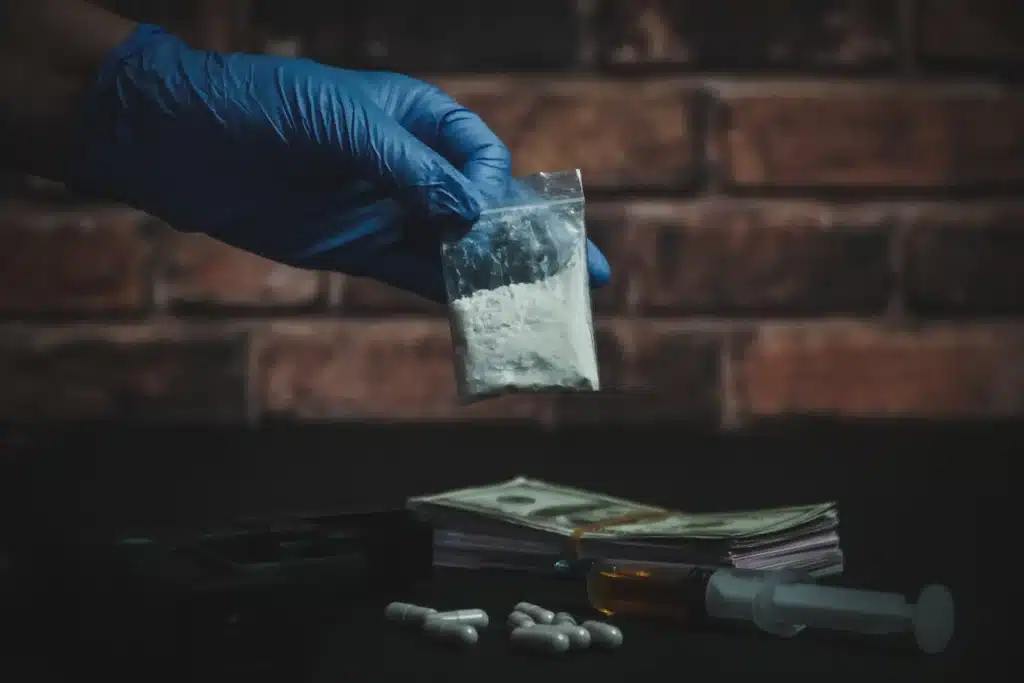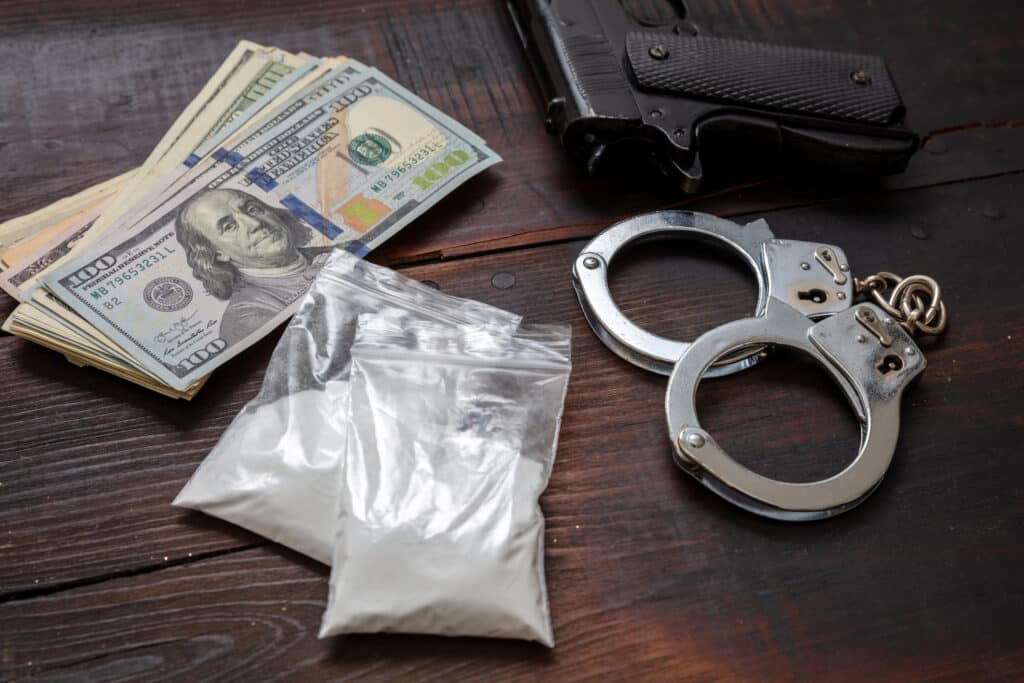Drug crimes can be prosecuted under state or federal law, and each system handles these types of charges differently. While state laws often cover smaller, local crimes, federal laws typically apply to larger cases involving interstate drug activity or major trafficking operations.
Whether a drug crime is handled under state or federal law depends on factors such as the location of the crime, the type of drug involved, and the scale of the offense. The distinction between state and federal court is a crucial one, as it impacts the severity of the charges and the potential penalties the defendant will face.
What Are Federal Drug Possession Charges?
A drug charge becomes a federal offense when it meets certain criteria, such as trafficking drugs across state lines, possessing drugs on federal property, or violating federal drug trafficking laws. Federal law focuses on larger operations, organized distribution, or cases involving significant quantities of a substance.
Common federal drug charges include trafficking, distribution, and manufacturing of controlled substances. These charges are usually more severe than state-level possession charges, as they typically involve more significant amounts or criminal networks. Because they fall under federal sentencing guidelines, federal drug possession charges carry harsher penalties than state ones, often resulting in longer prison sentences and higher fines, especially for repeat offenders or high-quantity offenses.
Drug Possession Charges Can Vary by State
The laws regarding drug possession vary widely across the U.S. Some states impose severe penalties for all possession, while others, like Colorado, have decriminalized certain drugs like marijuana. And even within Colorado, charges vary tremendously between different drug types – although small amounts of marijuana are legal, possession of other drugs like cocaine or methamphetamine remains highly illegal and can lead to significant penalties.
Denver drug crimes defense attorneys like our team at MBS Law are skilled at navigating Colorado’s specific legal approach to drug use, manufacture, and sale. We can help defendants understand the charges they face and develop a defense strategy tailored to their unique circumstances.
Sentencing and Penalties: State vs. Federal
Sentencing for drug possession varies depending on whether the charges have been prosecuted at the state or federal level. Federal drug crimes tend to carry harsh penalties because of stricter sentencing guidelines, especially for larger quantities or repeat offenses. Federal charges can result in longer prison sentences and significant fines. This applies even to possession, particularly if it is linked to trafficking or broad distribution.
In contrast, state-level penalties are generally less severe, though this varies by jurisdiction. For example, in Colorado, first-time offenders for minor possession charges may face probation or treatment programs, while larger quantities or more dangerous drugs can still result in jail time. The main distinction lies in the scale of the offense. Federal courts typically handle larger, more serious cases, which leads to more severe outcomes.
Why Are Drugs Illegal at the Federal and State Levels?
Drug laws exist at both the federal and state levels to regulate controlled substances, protect public health, and combat illegal drug distribution. Enacted by Congress in 1970, the Controlled Substances Act (CSA) provides the legal framework for federal drug regulation, categorizing drugs into schedules based on their potential for abuse and medical use. Drugs like heroin and cocaine are placed in higher schedules due to their higher risk, while lower schedules include medications with accepted medical uses.
At the state level, laws can differ widely. States have the power to regulate drug use within their borders, leading to varied policies — particularly around substances like marijuana. For example, Colorado has legalized recreational marijuana, while it remains illegal under Federal law. These differences arise from the state’s ability to manage local public health concerns, while the federal government focuses on controlling larger-scale drug issues, including trafficking. Historically, drug laws have been shaped by concerns about addiction, crime, and public safety. Today’s regulations reflect the ongoing governmental effort to control drug abuse and limit its negative societal impact.
The Role of a Denver Drug Crimes Defense Attorney
Securing the help of an experienced Denver drug crimes defense attorney is essential if you are facing drug charges, whether state or federal. Not only do these legal experts understand the ins and outs of the charges you might be facing, but they can also determine the best course of action for your unique situation.
Attorneys skilled in drug crime defense know how to navigate the specifics of Colorado law while also addressing the stricter standards in federal cases. They ensure client rights are protected at every step — from plea negotiations to trial. Understanding jurisdiction is vital to developing an effective defense strategy, since it impacts everything from how evidence is handled to the sentencing guidelines.
Are You Facing Drug Possession Charges in Colorado?
Understanding whether the jurisdiction of your drug charges is state or federal is critical to knowing what you’re up against. The penalties, legal processes, and outcomes can differ significantly depending on the nature of the charge. Given the complexities of both federal and state drug laws, seeking help from a knowledgeable Denver drug crimes defense attorney is essential to protecting your rights and receiving the best possible defense.
With the right legal guidance, navigating these complex laws becomes much more manageable. Face your charges with confidence, knowing your defense is in experienced hands.








